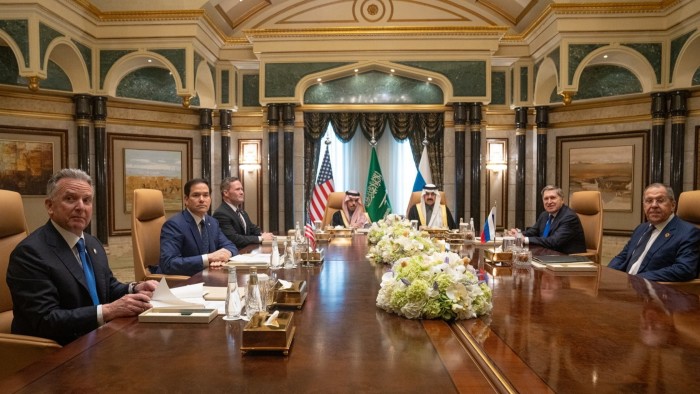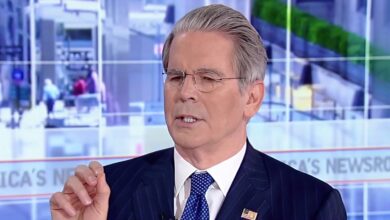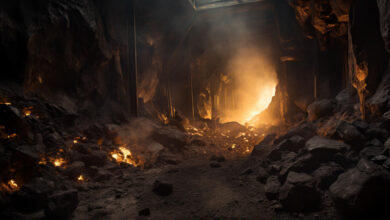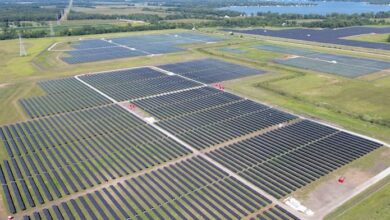US and Russia agree to ‘lay the groundwork’ for ending Ukraine war

Russia and the US have agreed to “lay the groundwork for future co-operation” on ending the Ukraine war and a lightning normalisation of relations, after their first high-level talks on the conflict since President Vladimir Putin’s invasion.
Following four-and-a-half hours of negotiations in Riyadh on Tuesday, the US state department said the two sides would appoint “high-level teams” to seek to end the war and establish a diplomatic channel to resolve bilateral issues.
The talks marked an extraordinary turnaround in just a matter of days after US President Donald Trump called Putin last week in an effort to end the war — without consulting Ukraine or its European allies.
“This needs to be a permanent end to the war and not a temporary end as we’ve seen in the past,” said US national security adviser Mike Waltz, who accompanied secretary of state Marco Rubio and Trump’s special envoy Steve Witkoff at the talks.
Tuesday’s meeting in Riyadh was the first of its kind between the US and Russia since Moscow’s February 2022 invasion of Ukraine. In a sight almost unthinkable even a few weeks ago, Russian and US flags flew next to each other outside the opulent palace where the meeting took place.
“The practical reality is that there’s going to be some discussion of territory and there’s going to be discussion of security guarantees, those are just fundamental basics,” Waltz added, noting that Trump was “determined to move very quickly”.
In language largely echoed by the Russian side, the US state department said the new diplomatic channel between the two countries would “lay the groundwork for future co-operation on matters of mutual geopolitical interest and historic economic and investment opportunities” following an end to the Ukraine war.
Kirill Dmitriev, chief executive of Russia’s sovereign wealth fund, told the FT the two sides had discussed “restoring economic ties in those areas which are of mutual interest”.
Dmitriev, who was in Riyadh during the talks, declined to offer specific details but said this could include joint investments in “various companies”, creating “joint companies with American partners”, and investing in the Arctic.
The US-Russia rapprochement has sparked fears in Kyiv and European capitals that Trump wants to settle the conflict on Moscow’s terms.
Washington appeared to have given in to some of Putin’s core demands before Tuesday’s talks even began, after saying Ukraine’s ambitions to join Nato and reclaim territory currently occupied by Russia were not “realistic”.
In a sign of the hard line Putin would take on Ukraine, the Russian side stressed it was “essential to settle the initial reasons” for the conflict and ensure “the legal interests of all countries in the region”.
That indicated the Kremlin had not dropped its goals of conquering large areas of Ukraine and making it all but impossible for the country to remain a functioning state.
Russia ruled out a role for Europe in the talks and demanded Nato rescind an open-ended 2008 invitation for Kyiv to join the alliance.
Ukrainian President Volodymyr Zelenskyy said he had rescheduled a visit to Saudi Arabia after the US-Russian talks, describing Tuesday’s meeting as a “surprise”.
Yuri Ushakov, Putin’s foreign policy adviser, said the US and Russia would work to “create the conditions” for a Trump-Putin meeting, but he said this would probably not take place next week because “thorough work” was needed first.
Ushakov added that Keith Kellogg, Trump’s envoy for the conflict, would handle relations with Ukraine and Europe, meaning the US would appoint someone else to take the lead with Moscow.

Russian foreign minister Sergei Lavrov said the two sides had agreed to “ensure the prompt appointment of ambassadors to each other’s capitals and remove the obstacles that the Biden administration has put in place regarding our diplomatic missions”.
These barriers included “the expulsion of diplomats, the issue of the seizure of our property and banking transactions”, Lavrov said. “Our deputies will soon arrange a meeting to assess the need for removing these barriers,” he added.
Normalising bilateral relations would require lifting US sanctions against Russia, which has been one of Moscow’s main demands.
Rubio said the EU was “going to have to be at the table at some point because they have sanctions as well that have been imposed”.
Asked what concessions Moscow would make in return, the US secretary of state said any such step would result from “hard, difficult diplomacy” in “closed rooms over a period of time”.
He added: “No one is being sidelined here.”
But as Europe seeks to respond to the US-Russian talks, French President Emmanuel Macron is planning an emergency meeting of European leaders on Wednesday, the second so far this week, according to people briefed on the plans.
The meeting is largely intended for countries that were not invited to the previous summit on Monday, when leaders clashed over dispatching peacekeeping forces to Ukraine. While the UK offered to put “boots on the ground”, Germany, Italy, Poland and Spain expressed reluctance to do so.
Lavrov said on Tuesday that any European peacekeeping deployment was “unacceptable”. He also implied Moscow had rejected a US request to halt attacks on Ukrainian energy infrastructure, claiming — falsely — that Russia did not attack civilian targets.
Waltz said the US was conducting “shuttle diplomacy” and had consulted Zelenskyy and Macron, while Trump will meet UK Prime Minister Keir Starmer next week.
He rejected the “notion that our allies haven’t been consulted”.
Kyiv has said it will reject any deal imposed on it without its involvement, while European countries have been left scrambling to claw back a seat at the table.
As Tuesday’s talks took place, Zelenskyy visited his Turkish counterpart Recep Tayyip Erdoğan, who has previously sought to play a brokering role in the conflict.
“We don’t want a peace brokered behind the scenes without our involvement,” the Ukrainian president said. “Without Ukraine, peace cannot be achieved.”
Additional reporting by Polina Ivanova and Anastasia Stognei in Berlin, Ayla Jean Yackley in Istanbul, Henry Foy in Brussels, Leila Abboud in Paris and George Parker in London
https://www.ft.com/__origami/service/image/v2/images/raw/https%3A%2F%2Fd1e00ek4ebabms.cloudfront.net%2Fproduction%2F789262c4-971a-4543-acf0-4871536a7ee1.jpg?source=next-article&fit=scale-down&quality=highest&width=700&dpr=1
2025-02-18 11:54:34




